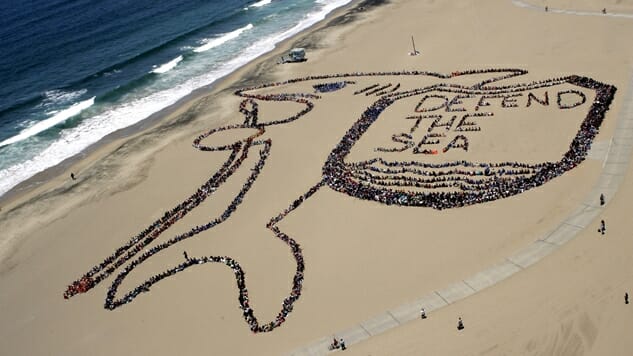A Rare Piece of Good News in the War Against Climate Change
Photo by Handout/Getty
Make no mistake about it—we are in a war for the survival of our modern world. If older generations wonder why millennials have such a “lol nothing matters” aura to our lives, the fact that there’s a nonzero chance that we will outlive coastal cities like Miami and New Orleans is a big reason why. It’s difficult to be optimistic about the future when every scientist is telling us that we’ve likely passed the point of no return when it comes to seriously combating climate change, and if we haven’t, that point is right around the corner. We coat ourselves in a thick layer of irony because seriously considering what the planet will look like when we’re approaching retirement is a genuinely terrifying exercise. Our future was sold out to feed the last generation’s insatiable desire for consumption. Thanks to capitalism, this is our new normal.
Right now, there are three hurricanes in the Atlantic taking divergent paths. @alroker has the forecast for Hurricane Florence, including when and where the storm’s expected to make landfall. pic.twitter.com/X3WacXPjJZ
— TODAY (@TODAYshow) September 10, 2018
In 25 years @fema i have never seen a situation like this before. If you are in any of those paths, it is time to prepare yourself. pic.twitter.com/7XT3hYot6O
— Marty Bahamonde (@MartyJBahamonde) September 9, 2018
Everything you read these days on the topic of climate change—which our military considers a serious threat to national security even though Republicans don’t—reads like the first act of a horror movie. Baby boomers tend to care less about this harrowing reality, likely because they won’t be alive to see Act III. My generation will, and you see this split in how millennial Republicans view the topic versus their older cohorts. Last year’s hurricanes in Houston, South Florida and Puerto Rico were a preview of the decades to come. Millions of people across the world are going to die, and millions more (billions?) will be displaced by a literal existential threat to the existence of humanity. The news around this topic is perpetually horrifying.
Which is why I’d like to take today to focus on a good piece of news in the war against climate change. On Saturday, a new, incredibly aggressive initiative to clean up the Great Pacific Garbage Patch was launched by The Ocean Cleanup. If you’re not familiar with the Great Pacific Garbage Patch, here are some key figures about its staggering largess (which we recently discovered is 16 times larger than we previously thought):
— It’s about 1.6 million square kilometers large—more than twice the size of Texas.
— There are about 1.8 trillion pieces of plastic in the patch, working out to 79,000 metric tons—roughly the weight of 43,000 cars.
— Discarded fishing equipment is largely to blame, as fishing nets account for 46% of the trash in the patch.
— A new study found that plastic pollution in the entire ocean could triple in the next 30 years unless a “major response” is mounted to counter it.
Well, here is hopefully the beginning of a major response.
Boyan Slat, a Dutch inventor, conceived of this project in 2013 at age 18. Along with 70 staff members, he spent the last five years testing 273 models and six different prototypes before landing on the concept above, named “Wilson”—after the famed volleyball who played opposite Tom Hanks in Castaway. On Saturday, it finally made its maiden voyage out to the ocean for its final round of testing.
The Ocean Cleanup Project tackles the Great Pacific Garbage Patch. https://t.co/lmyZMWZyIFpic.twitter.com/z3vFKMTwLg
— USA TODAY Video (@usatodayvideo) September 8, 2018
Ultimately, the fight against ocean pollution begins by not polluting the ocean. Efforts like this to clean up after-the-fact are clearly vital given the dispiriting status quo, but to truly reverse this planet-poisoning trend, we must curb our reliance on plastics and find ways to stop fishermen and their massive companies from discarding their equipment in the ocean.
Plus, some environmentalists are skeptical of the claim that this system could remove 90% of surface plastics globally by 2040, and there is still some concern that fish like tuna could get caught up in the debris. But the promise of this kind of sustainable system is inspirational if nothing else, and it serves as a model to prove that big ideas to make radical changes to our unsustainable course can be implemented. Nothing like this has ever been attempted, and the mere fact that this idea went from prototype to full-scale model to actually hitting the water this weekend is proof that we do not have to take our harrowing future lying down. We can fight back against climate change.
If you want to help The Ocean Cleanup, you can donate here.
Jacob Weindling is a staff writer for Paste politics. Follow him on Twitter at @Jakeweindling.







































